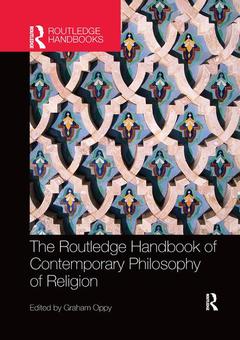The Routledge Handbook of Contemporary Philosophy of Religion Routledge Handbooks in Philosophy Series
Coordonnateur : Oppy Graham

Philosophy of religion has experienced a renaissance in recent times, paralleling the resurgence in public debate about the place and value of religion in contemporary Western societies. The Routledge Handbook of Contemporary Philosophy of Religion is an outstanding reference source to the key topics, problems and debates in this exciting subject. Comprising over thirty chapters by a team of international contributors, the Handbook is divided into seven parts:
- theoretical orientations
- conceptions of divinity
- epistemology of religious belief
- metaphysics and religious language
- religion and politics
- religion and ethics
- religion and scientific scrutiny.
Within these sections central issues, debates and problems are examined, including: religious experience, religion and superstition, realism and anti-realism, scientific interpretation of religious texts, feminist approaches to religion, religion in the public square, tolerance, religion and meta-ethics, religion and cognitive science, and the meaning of life. Together, they offer readers an informed understanding of the current state of play in the liveliest areas of contemporary philosophy of religion.
The Routledge Handbook of Contemporary Philosophy of Religion is essential reading for students and researchers of philosophy of religion from across the Humanities and Social Sciences.
Introduction
Part 1: Theoretical Orientations
1. Feminist Approaches to Religion Beverley Clack
2. Phenomenological Approaches to Religion John Manoussakis
3. Postmodern Approaches to Religion Nick Trakakis
4. New Atheist Approaches to Religion Trent Dougherty and Logan Paul Gage
5. Wittgensteinian Approaches to Religion Genia Schönbaumsfeld
6. Fundamentalist Approaches to Religion Harriet Harris
Part 2: Conceptions of Divinity
7. Chinese Conceptions of Divinity Karen Lai
8. Islamic Conceptions of Divinity Imran Aijaz
9. Hindu Conceptions of Divinity Monima Chadha
10. Christian Conceptions of Divinity John Bishop
Part 3: Epistemology of Religious Belief
11. Religious Experience Jerome Gellman
12. Religious Faith Mark Wynn
13. Religious Disagreement Bryan Frances
14. Religion and Superstition Ed Feser
Part 4: Metaphysics and Religious Language
15. Realism and Anti-Realism Michael Scott
16. Analogy, Metaphor and Literal Language Roger M. White
17. Scientific Interpretation of Religious Texts David Bartholomew
18. Metaphysics and Religion Kevin Hart
Part 5: Religion and Politics
19. Religious Pluralism Victoria Harrison
20. Religion in the Public Square Marci Hamilton
21. Religious Tolerance Mehdi Aminrazavi
22. Religious Violence Daniel McKaughan
Part 6: Religion and Ethics
23. Religion and Metaethics Michael Smith
24. Religion and Normative Ethics David Oderberg
25. Religion and the Meaning of Life Neil Levy
26. Religion and Suffering Michael Levine
27. Religion and Flourishing Christopher Toner
Part 7: Religion and Scientific Scrutiny
28. Religion and Reason Rob Koons
29. Religion and Cognitive Science Todd Tremlin
30. Religion and Science Sahotra Sarkar
31. Religion and Metaphysical Naturalism Neil Manson.
Index
Graham Oppy is Professor of Philosophy at Monash University, Australia. He is co-editor of the multivolume work The History of Western Philosophy of Religion, and author of Ontological Arguments and Belief in God, Arguing about Gods, Philosophical Perspectives on Infinity, The Best Argument against God, Reinventing Philosophy of Religion, Describing Gods: An Investigation of Divine Attributes, and co-author of Reading Philosophy of Religion.
Date de parution : 10-2017
17.4x24.6 cm
Thème de The Routledge Handbook of Contemporary Philosophy of... :
Mots-clés :
alvin; plantinga; divine; command; theory; religious; believer; richard; swinburne; gods; Young Man; Hyperactive Agency Detection Device; Christian Mystical Practice; Young Earth Creationism; Pope Emeritus Benedict XVI; Benedict XVI; ST 2a2ae; Huang Di; Ipsum Esse Subsistens; Good Life; Vice Versa; Personal omniGod; Divine Command Theory; Dawkins 2006a; Ibn Hanbal; Superb; Aquinas; St Thomas Aquinas; Agency Detection Device; Animal Kingdom; Human Suffering; Id Theorist; ESC Research; Van Inwagen; Doxastic Practice



